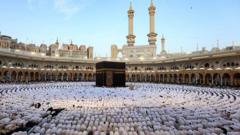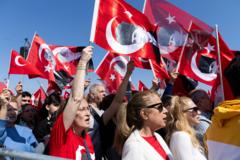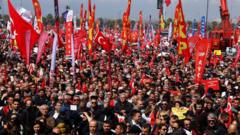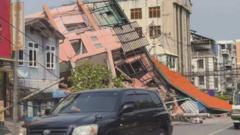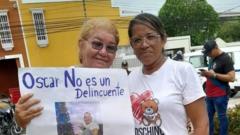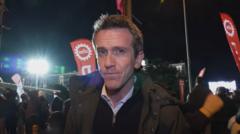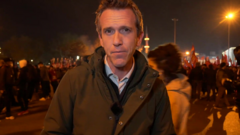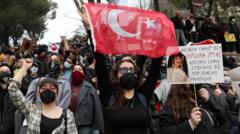Mark Lowen, BBC's correspondent, shares an intense experience during his recent coverage of protests in Turkey, highlighting the clampdown on press freedom as demonstrators rally for democracy in an increasingly authoritarian regime.
BBC Reporter Mark Lowen's Harrowing Experience in Turkey: A Call for Democracy

BBC Reporter Mark Lowen's Harrowing Experience in Turkey: A Call for Democracy
Mark Lowen recounts his abrupt deportation from Turkey amid anti-government protests in Istanbul as reporters strive for freedom and democracy.
Mark Lowen, the BBC correspondent who was recently deported from Turkey, shared a vivid account of his abrupt removal while covering the ongoing anti-government protests in Istanbul. After feeling a sense of excitement about returning to a city he once called home, Lowen received an unexpected call at his hotel from the receptionist requesting him to come down for an urgent discussion.
Upon arrival, three plain-clothes policemen awaited him and demanded his passport, excluding his colleagues from filming the encounter. Lowen had already spent three days reporting on the protests ignited by the controversial arrest of Istanbul's mayor, Ekrem Imamoglu. Shortly after, he was taken to police headquarters, where he was detained for seven hours but managed to maintain a cordial atmosphere with some officers who expressed dissent against the government's decision to detain him.
Later in the evening, Lowen was transferred to the foreigners' custody unit where he encountered a more hostile environment. Despite his attempts to communicate in broken Turkish, he experienced a series of frustrating processes including fingerprinting and being denied legal representation. In the early hours of Thursday, he was handed deportation papers citing him as a "threat to public order," with the explanation that the decision stemmed from the government.
The officers even suggested he film a statement to claim he was leaving voluntarily, a request he declined, wary of how it could be used by state-controlled media. After 17 hours of detention, Lowen was moved to the airport's custody department, where lack of sleep became a near-impossible reality amid frequent disruptions.
Eventually, he was put on a flight back to London, where the Turkish government's press office later stated he had failed to secure the correct accreditation. This reasoning had not been mentioned during his detention, indicating an attempt to retroactively justify the incident.
Despite the distressing experience, Lowen acknowledged that he was fortunate to have the support of BBC management and the British Consulate. In contrast, he highlighted the plight of many journalists in Turkey, reflective of the country's dismal ranking of 158th out of 180 in the Press Freedom Index by Reporters Without Borders. The protests, sparked by Imamoglu's arrest, symbolize a broader demand for democracy as Turkey veers towards authoritarianism.
As President Recep Tayyip Erdogan dismisses the protests as "street terrorism" while feeling bolstered by international alliances, the resilience of demonstrators raises questions about the direction of Turkey's political landscape. The uncertainty looms as to whether the burgeoning protests, reminiscent of the largest demonstrations in over a decade, will retain their momentum or succumb to Erdogan's firm grip on power.




